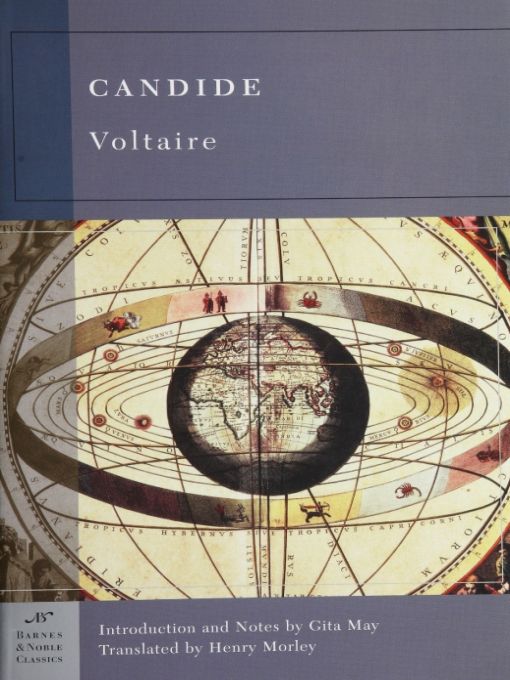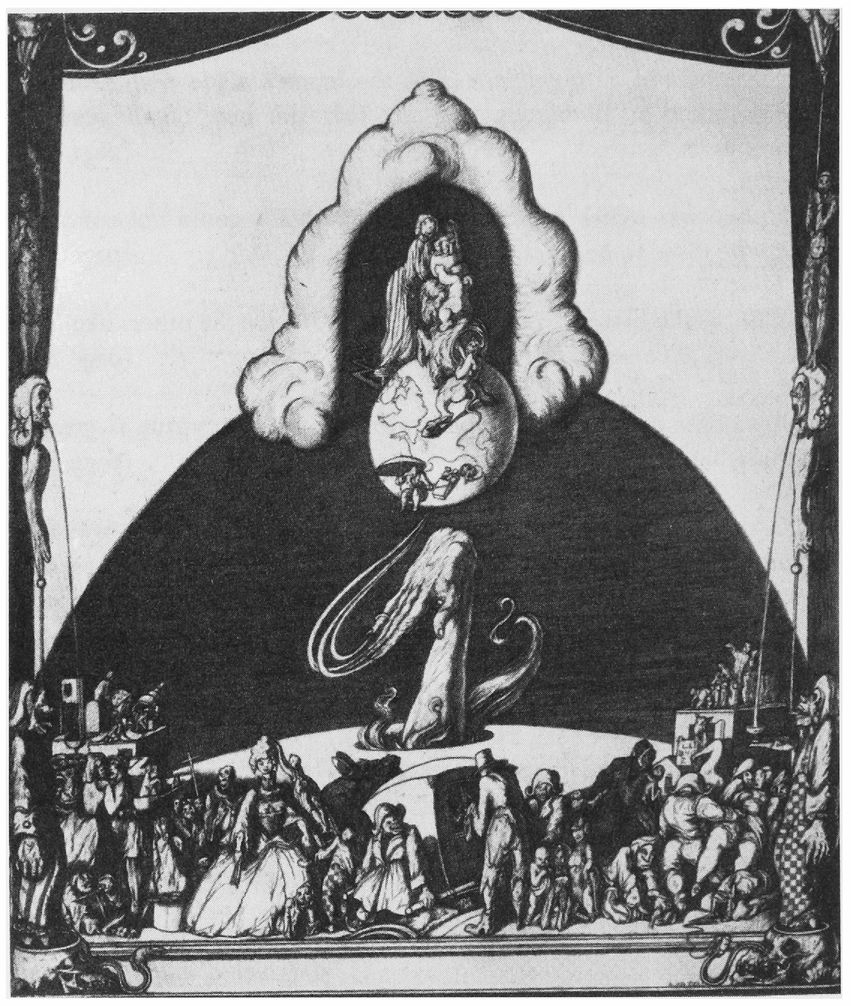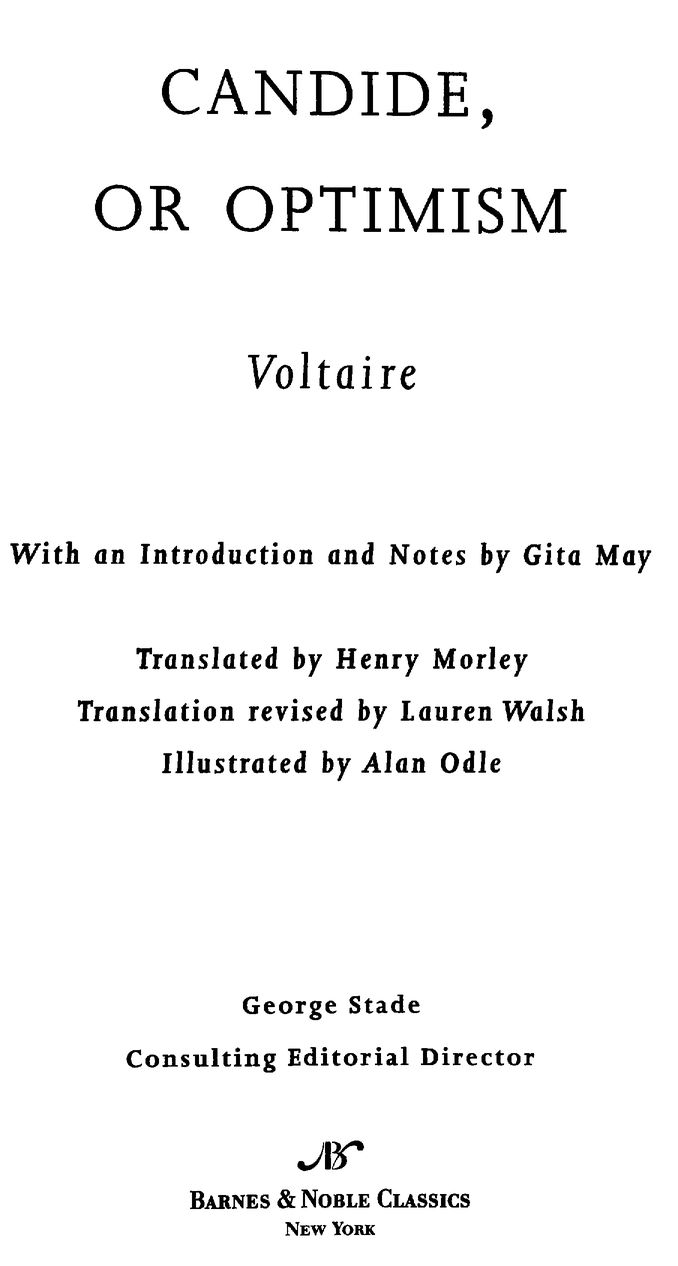Candide
Authors: Voltaire


Table of Contents
FROM THE PAGES OF CANDIDE
In this best of all possible worlds the baron’s castle was the most
magnificent of all castles, and my lady the best of all possible
baronesses. (page 12)
magnificent of all castles, and my lady the best of all possible
baronesses. (page 12)
Candide was struck with amazement and really could not conceive
how he came to be a hero. (page 15)
how he came to be a hero. (page 15)
“If this is the best of all possible worlds, what are the others like?”
(page 29)
(page 29)
“A modest woman may be once violated, but her virtue is greatly
strengthened as a result.” (page 33)
strengthened as a result.” (page 33)
“In the different countries in which it has been my fate to wander,
and the many inns where I have been a servant, I have observed a
prodigious number of people who held their existence in abhorrence,
and yet I never knew more than twelve who voluntarily put an
end to their misery.” (page 50)
and the many inns where I have been a servant, I have observed a
prodigious number of people who held their existence in abhorrence,
and yet I never knew more than twelve who voluntarily put an
end to their misery.” (page 50)
“Never while I live shall I lose the remembrance of that horrible day
on which I saw my father and brother barbarously butchered before
my eyes, and my sister ravished.” (page 59)
on which I saw my father and brother barbarously butchered before
my eyes, and my sister ravished.” (page 59)
“In this country it is necessary, now and then, to put one admiral to
death in order to inspire the others to fight.” (page 100)
death in order to inspire the others to fight.” (page 100)
“Our labour keeps us from three great evils—boredom, vice, and
want.” (page 129)
want.” (page 129)
“We must cultivate our garden.” (page 130)
DR. PANGLOSS SURVEYS THE WORLD.



Published by Barnes & Noble Books
122 Fifth Avenue
New York, NY 10011
122 Fifth Avenue
New York, NY 10011
Candide
was first published in French in 1759.
Henry Morley’s translation was first published in 1922.
was first published in French in 1759.
Henry Morley’s translation was first published in 1922.
Published in 2003 by Barnes & Noble Classics with new Introduction,
Notes, Biography, Chronology, Inspired By, Comments & Questions,
and For Further Reading.
Notes, Biography, Chronology, Inspired By, Comments & Questions,
and For Further Reading.
Introduction, Notes, and For Further Reading
Copyright © 2003 by Gita May.
Note on Voltaire, The World of Voltaire and
Candide
,
Inspired by
Candide
, and Comments & Questions
Copyright @ 2003 by Barnes & Noble, Inc.
Candide
,
Inspired by
Candide
, and Comments & Questions
Copyright @ 2003 by Barnes & Noble, Inc.
All rights reserved. No part of this publication may be
reproduced or transmitted in any form or by any means, electronic or mechanical,
including photocopy, recording, or any information storage and retrieval system,
without the prior written permission of the publisher.
reproduced or transmitted in any form or by any means, electronic or mechanical,
including photocopy, recording, or any information storage and retrieval system,
without the prior written permission of the publisher.
Barnes & Noble Classics and the Barnes & Noble Classics
colophon are trademarks of Barnes & Noble, Inc.
colophon are trademarks of Barnes & Noble, Inc.
Candide
ISBN-13: 978-1-59308-028-0
ISBN-10: 1-59308-028-X
ISBN-10: 1-59308-028-X
eISBN : 97-8-141-14318-9
LC Control Number 2003102532
Produced and published in conjunction with:
Fine Creative Media, Inc.
322 Eighth Avenue
New York, NY 10001
Fine Creative Media, Inc.
322 Eighth Avenue
New York, NY 10001
Michael J. Fine, President and Publisher
Printed in the United States of America
QM
10
QM
10
VOLTAIRE
F
rançois-Marie Arouet (pen name “Voltaire”) was born in Paris on November 21, 1694, into a middle-class family. His formal education took place at the Jesuit College Louis-le-Grand, where he studied Latin and Greek literature and drama. Despite his father’s wish that he pursue a career in the law, he chose to devote himself to writing. After completing his education, François began moving in radical political circles and became infamous in Paris as a brilliant and sarcastic wit. For allegedly penning two libelous poems about the French regent, the duke of Orleans, he was imprisoned in the Bastille; during an eleven-month detention he completed his first dramatic tragedy,
Oedipe
, which was a critical success, and around this same time adopted the pen name “Voltaire. ”
rançois-Marie Arouet (pen name “Voltaire”) was born in Paris on November 21, 1694, into a middle-class family. His formal education took place at the Jesuit College Louis-le-Grand, where he studied Latin and Greek literature and drama. Despite his father’s wish that he pursue a career in the law, he chose to devote himself to writing. After completing his education, François began moving in radical political circles and became infamous in Paris as a brilliant and sarcastic wit. For allegedly penning two libelous poems about the French regent, the duke of Orleans, he was imprisoned in the Bastille; during an eleven-month detention he completed his first dramatic tragedy,
Oedipe
, which was a critical success, and around this same time adopted the pen name “Voltaire. ”
When threatened with imprisonment for a second time, Voltaire instead chose exile to England, where he lived for two and a half years. He carefully studied English society and was particularly impressed by the constitutional monarchy and the religious freedom the English enjoyed, which he praised in
Letters Concerning the English Nation
(1733). When this work was published in French the following year as
Lettres philosophiques
, it was interpreted as critical of the French government and caused a great stir. Voltaire left Paris and spent the next fifteen years at the estate of his mistress, Madame du Châtelet. During this time, he published
Elements de la philosophie de Newton
(
Elements of Newton’s Philosophy;
1738), was appointed the royal historiographer of France, and was elected to the prestigious French Academy. During the early 1750s he was associated with the court of Frederick the Great in Prussia; while there he published the historical work
Le siècle de Louis XIV
(
The Age of Louis XIV
; 1751).
Letters Concerning the English Nation
(1733). When this work was published in French the following year as
Lettres philosophiques
, it was interpreted as critical of the French government and caused a great stir. Voltaire left Paris and spent the next fifteen years at the estate of his mistress, Madame du Châtelet. During this time, he published
Elements de la philosophie de Newton
(
Elements of Newton’s Philosophy;
1738), was appointed the royal historiographer of France, and was elected to the prestigious French Academy. During the early 1750s he was associated with the court of Frederick the Great in Prussia; while there he published the historical work
Le siècle de Louis XIV
(
The Age of Louis XIV
; 1751).
Two great events of the mid-1750s have a profound effect on Voltaire. Tens of thousands of people were killed in a great earthquake in Lisbon in 1755, and in 1756 the devastating Seven Years War began. Influenced in part by these events, Voltaire came to reject the philosophy of German philosopher Gottfried Wilhelm Leibniz, which was based on the concept of a rational and well-regulated universe. In 1759 Voltaire retreated to Ferney, an estate near the France-Switzerland border, where he wrote philosophical poems, letters, and narratives, including the philosophical tale
Candide
(1759), in which he spoofed the idea that ours is the “best of all possible worlds.”
Candide
(1759), in which he spoofed the idea that ours is the “best of all possible worlds.”
Voltaire was an adamant critic of religious intolerance and persecution. The memorable closing line of
Candide
, “Let us cultivate our garden,” has been interpreted to mean that the proper course of action for humankind is to perform practical, useful work. Voltaire died in 1778 at the age of eighty-four, leaving behind a body of work that epitomizes the Enlightenment.
Candide
, “Let us cultivate our garden,” has been interpreted to mean that the proper course of action for humankind is to perform practical, useful work. Voltaire died in 1778 at the age of eighty-four, leaving behind a body of work that epitomizes the Enlightenment.
THE WORLD OF VOLTAIRE AND
CANDIDE
CANDIDE
| 1694 | Voltaire is born François-Marie Arouet in Paris on November 21. |
| 1704 | François enrolls at the College Louis-le-Grand, a Jesuit institution, where he studies classical literature and drama. |
| 1711 | After leaving Louis-le-Grand, François pursues writing as a career, despite his father’s wishes that he study law. |
| 1714 | To the dismay of his father, François meets with members and explores the ideology of the radical Society of the Temple; he writes satirical poems. |
| 1715 | King Louis XIV dies. His great grandson, Louis XV, ascends to the throne, but because he is only five years old, the duke of Orleans assumes the regency until his death in 1723. The royal court leaves the confined environment of Versailles to take up residence in the more liberal atmosphere of Paris, one of the events that marks the beginning of the Enlightenment in France. |
| 1717- 1718 | Beginning in May, François is imprisoned in the Bastille for eleven months after the duke of Orleans wrongly accuses him of writing two libelous poems about the French government. In prison, he writes his first dramatic tragedy, Oedipe ( his version of the Oedipus myth) and La Henriade , an epic poem about Henry IV of France. |
| 1718 | The theatrical success of Oedipe wins François a pension from the regent. |
| 1719 | Francois-Marie Arouet assumes the pen name Voltaire. |
| 1723 | The first edition of La Henriade is published. Upon the |
| death of the duke of Orleans, Louis XV accedes to the throne. However, France is ruled by the duke of Bourbon and Cardinal de Fleury, who revamp France’s economic policies. | |
| 1725 | In September Voltaire attends Louis XV’s marriage, at which three of his plays are performed. |
| 1726 | Voltaire is sent to the Bastille for the second time for challenging the chevalier de Rohan to a duel. After two weeks, he is offered exile as an alternative and emigrates to England, where he spends the next two and a half years learning English and studying the philos ophies of philosopher John Locke and mathematician and physicist Isaac Newton. He also attends productions of the plays of William Shakespeare. |
| 1728 | The second edition of La Henriade is published. |
| 1729 | Voltaire gains the right to return to Paris. |
| 1730 | Indignant at the clergy’s refusal to properly bury the body of famed actress Adrienne Lecouvreur, Voltaire writes a protest poem, The Death of Mademoiselle Lecouvreur. His tragedy Brutus receives accolades following its opening performance. |
| 1731 | Voltaire publishes the first of his historical works, Charles XII , a life of the Swedish monarch, which remains today a classic of biography. |
| 1732 | Voltaire’s heroic tragedy Zaire , a tale of doomed love, is a success. |
| 1733 | Voltaire begins his long affair with Madame du Châ telet. Letters Concerning the English Nation is published in English. The book, which praises the English monarchy and the country’s religious tolerance, is interpreted as critical of the French church and state. |
| 1734 | Letters Concerning the English Nation is published in French as Lettres philosophiques . It is banned in France, and Voltaire seeks refuge at Cirey in the province of Champagne , where for the next fifteen years he lives at the estate of Madame du Châtelet. |
| 1735 | Although granted the right to return to Paris, Voltaire chooses to remain at Cirey, returning to the city only |
| occasionally. He spends time conducting physical and chemical experiments and writing. He begins a correspondence with Crown Prince Frederick of Prussia (later Frederick the Great), with whom he will have a rocky relationship. | |
| 1738 | Elements de la philosophie de Newton ( Elements of Newton’s Philosophy ) is published. |
| 1745 | Through the influence of Madame de Pompadour, Louis XV’s mistress, Voltaire is appointed the royal historiographer of France. |
| 1746 | He is elected to the prestigious French Academy. |
| 1747 | Voltaire’s philosophical tale Zadig is published. |
| 1749 | Madame du Chatelet dies. Upon the invitation of Frederick the Great, Voltaire moves briefly to Potsdam. |
| 1750 | At Frederick’s request, Voltaire goes to Berlin to serve as philosopher-poet at the royal court. He will stay for three years. |
| 1751 | While at the German court, Voltaire publishes the historical work Le siècle de Louis XIV ( The Age of Louis XIV ), which advocates for social and moral progress. |
| 1752 | Voltaire publishes Micromégas , a fantastic travelogue that reflects Newton’s cosmology and Locke’s empiricism, and attempts to fuse science and moral philosophy. |
| 1753 | Voltaire leaves Berlin after an argument with Frederick (the two will later reconcile and resume a correspondence ). Unable to return to France, Voltaire stays in various towns on the border until December 1754, when he moves to Geneva. |
| 1755 | Voltaire purchases a villa, Les Délices, outside Geneva, and makes it his home. After a devastating earthquake kills tens of thousands in Lisbon, Voltaire rejects the concept of a rational and well-regulated universe, as advocated by the German philosopher Gottfried Wilhelm Leibniz. |
| 1756 | The Seven Years War begins and will last until 1763. It is fought in Europe, with North America, and India, by France, Austria, Russia, Saxony, Sweden, and eventually Spain one side, and Prussia, Great Britain, and |
| Hanover on the other. This complex war is based on colonial rivalry between France and England, and a struggle for power in Germany between Austria and Prussia. Along with the Lisbon earthquake, it deeply affects Voltaire’s outlook. Voltaire publishes Poème sur le désastre de Lisbonne ( Poem on the Disaster of Lisbon ), in which he signals his rejection of Leibniz’s approach. | |
| 1757 | After its seventh volume is published, the Encyclopédie —co-edited by Denis Diderot to provide a survey of human knowledge from the standpoint of the Enlightenment (Voltaire was a contributor)—is banned in France. |
| 1759 | Voltaire buys an estate, Ferney, near the France- Switzerland border. It will become the intellectual capital of western Europe, and Voltaire will spend his last years there writing narratives, plays, and personal letters . The most notable of the narratives, published this year, is the philosophical tale Candide —an attack on the evils of religious fanaticism, war, colonialism, and slavery. |
| 1764 | The Dictionnaire philosophique —a compendium of Voltaire’s thoughts on a variety of subjects—is published. |
| 1774 | Louis XV dies, and Louis XVI takes the throne. |
| 1778 | Voltaire returns to Paris, where he is welcomed by the public. On May 30 he dies there at age eighty-four. His body initially is buried on the grounds of an abbey in Champagne. |
| 1791 | Voltaire’s remains are brought back to Paris and buried in the Pantheon. |
| 1787-1799 | The philosophy of the thinkers of the Enlightenment, including Voltaire—expressed in the motto “Liberty, Fraternity, Equality”—inspires the French Revolution. The subsequent reign of Napoleon Bonaparte preserves many of the freedoms won during the Revolution, including religious toleration and the abolition of serfdom. The Civil Code, also known as the Napoleonic Code, is established; it remains as the basis for the system of civil law in modern France. |
Other books
Beloved Beast by Greiman, Lois
Alive! Not Dead! by Smith, R.M.
How Tía Lola Ended Up Starting Over by Julia Alvarez
The Wife He Always Wanted by Cheryl Ann Smith
Shattered Skies: Beginning's End by Linn, Heather
The Complete Plays by Christopher Marlowe
Baby Be-Bop by Francesca Lia Block
Rogues and Ripped Bodices by Samantha Holt
The Vows of Silence by Susan Hill
Addicted In Cold Blood by Laveen, Tiana